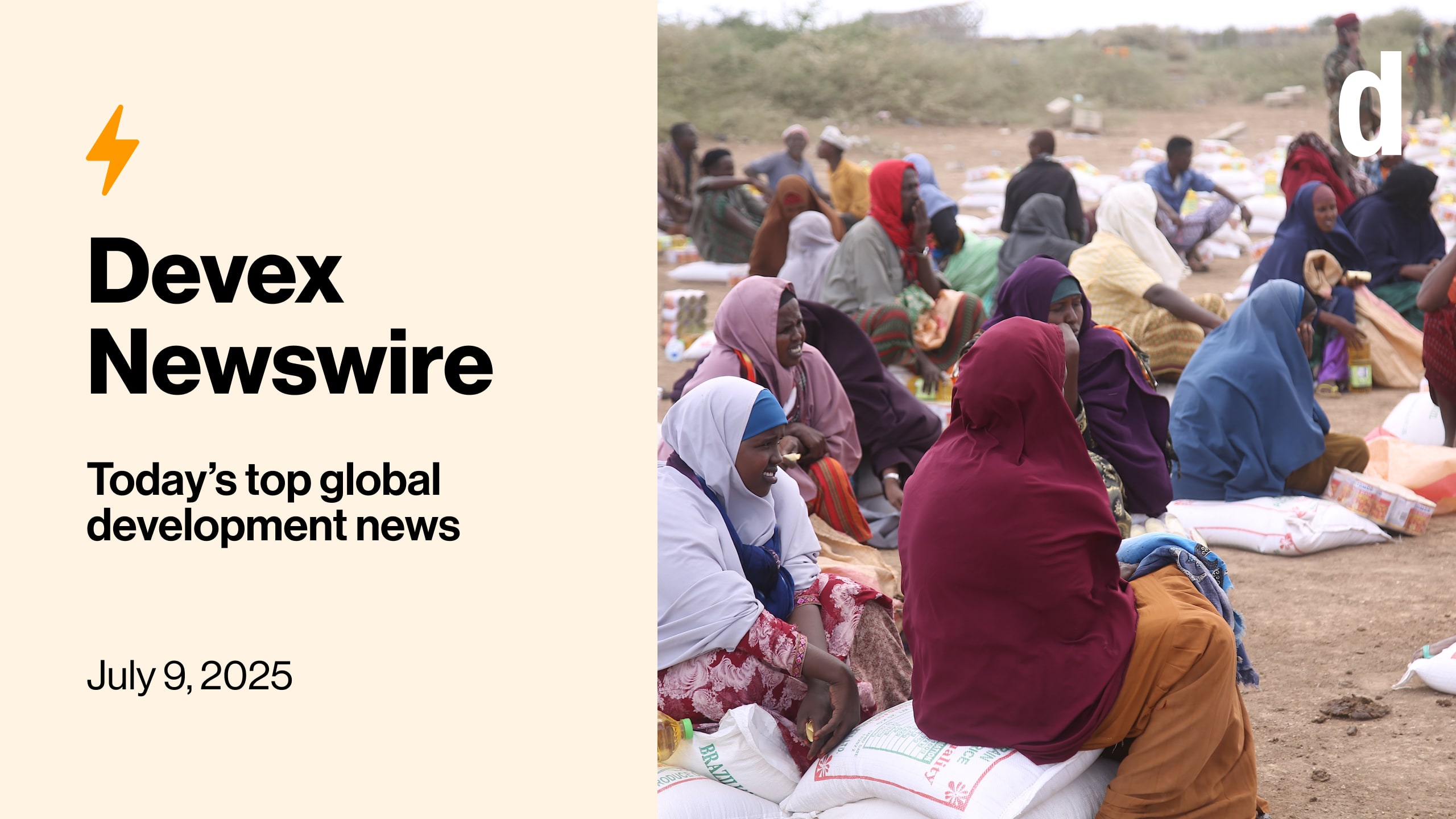
It’s official. The Labour Party’s Keir Starmer is the incoming U.K. prime minister. So, will his party rebuild Britain’s (tattered) reputation on international aid?
Also in today’s edition: Call it Latin America’s greatest global health export: FOPLs. The industry might hate it, but “front of package labels” for food and drinks are on the rise in the region as it tries to tackle obesity. We look at that battle today, as Colombia brings in compulsory labeling for products with excess sodium or sugar, saturated or trans fats.
New government, same aid policy?
As predicted, the United Kingdom voted to end 14 years of Conservative Party rule on Thursday. The widely respected, outgoing international development minister, Andrew Mitchell, was able to retain his seat, however.
This is a preview of Newswire
Sign up to this newsletter for an inside look at the biggest stories in global development, in your inbox daily.
If you are wondering what the incoming Labour government and Prime Minister Keir Starmer have in store for foreign aid, be sure to follow Devex U.K. Correspondent Rob Merrick.
But don’t expect any major changes soon. As Rob discussed with experts at a Devex Pro event last month, Labour is not planning to restore the dedicated aid department axed in 2020. And the U.K.’s massive aid budget cuts will only be reversed when “fiscal circumstances allow” — as the Tories were planning anyway.
Still, Romilly Greenhill, CEO of the U.K. NGO network Bond, says they are looking forward to working with the new government "to, in their own words, ‘turn the page to rebuild Britain’s reputation on international development.'"
"The first thing Sir Keir should do is to actually turn up at the big global summits," Greenhill says, after a series of no-shows by predecessor Rishi Sunak. September’s U.N. Summit for the Future would provide a good first opportunity to rebuild some of those relationships, she suggests.
For the latest episode of our weekly podcast series, Rob sits down with Devex Managing Editor Anna Gawel to discuss what the U.K. election and other elections across Europe mean for the global development sector.
ICYMI: On the UK election, new development development 'consensus' hides big challenges ahead (Pro)
Listen: What do the elections across Europe mean for global development?
+ We are also watching out for the U.S. election in November. So on July 22, we’ll be hosting Ben Rhodes, one of the U.S.’ top foreign policy experts, for unique insights into what the U.S. presidential election implies for globaldev. Sign up now to join us.
This event is part of Devex Pro Week, happening July 22-26. If you’re not a Pro member yet we’re offering $100 off an annual membership.
The medium is the message
“A good example of something coming from the global south that is gaining traction everywhere” — that’s how Isabel Barbosa, an associate director with the health and human rights initiative at Georgetown University’s O’Neill Institute, sums up front of package labels, known as FOPLs.
FOPLs first emerged in the late 1980s, but mandatory labeling with warnings about specific nutrients, such as excess sodium, only started to be implemented in recent years — and primarily in Latin America where 8 of the 10 countries that require FOPLs with nutrient details are, beginning with Chile where FOPLs went into effect in 2016.
In Chile, the immediate result was that people bought fewer of the products with warning labels, while manufacturers that didn’t want their products branded with FOPLs reduced their sugar and sodium content.
Now Colombia is the 16th country to be in the process of mandating some kind of FOPL. And more than a dozen nations across sub-Saharan Africa, Central America, and South Asia are currently developing FOPL policies, according to the Global Food Research Program.
Experts caution that it will take time to show substantial results, even in combination with other efforts. But, as Devex contributor Andrew Green, reports, with overweight and obesity on the rise across low- and middle-income countries, governments are desperate.
Read: Can warning labels help to guide consumers and counter obesity?
+ For the latest insider reporting on global health, be sure to sign up to Devex CheckUp, a free, Thursday newsletter.
Unmasking the ‘emerging donors’
Who hasn’t been at a global development conference where attendees discuss the plague of aid cuts in Western countries, only to a vague hope that “emerging donors” can fill the gap?
Devex development analysts Miguel Antonio Tamonan and Alecsondra Kieren Si have looked into the available data to bring you this piece on what the likes of Brazil, China, India, the Persian Gulf states, Turkey, and the United Arab Emirates are really doing.
In 2021, Brazil spent $1.3 billion on over 8,000 projects, for instance, a significant increase from the $358.5 million spent in the previous year.
China’s top recipient countries in 2021 were Sri Lanka, with $660 million; Tajikistan, with $201.9 million; and Myanmar, with $179 million.
Qatar focused mostly on education in 2022, followed by government and civil society, health, and then transportation.
We’ll have a larger emerging donors report coming soon. Sign up to Devex Pro to receive that and more.
Read: Emerging donors — and where they spend their aid (Pro)
Seeing hepatitis
Of the 50 million people living with hepatitis C globally in 2022, only 36% were aware of their infection. And of the 254 million people living with hepatitis B, only 13% were aware of their infection.
Hepatitis, a viral infection that causes liver disease, is responsible for 1.3 million deaths per year, similar to tuberculosis.
In her latest piece, Devex Senior Reporter Jenny Lei Ravelo looks at why testing numbers remain so low:
• Limited awareness and data: Due to a lack of symptoms people often ask why they should get tested.
• Cost of tests and scarce resources: Some African countries pay more than $100 for the same test that costs less than $10 elsewhere.
• Plus, a lack of political attention. Though not everywhere.
In Egypt — which once had the highest hepatitis C infections globally — prevalence is now down to less than 1%.
“They had mobile vans and community outreach, and every clinical setting was offering testing, and all at no charge to the citizen,” Dr. John Ward, director of the Coalition for Global Hepatitis Elimination, tells Jenny. “Those who tested positive for infection were referred for treatment, which was given for free.”
The coalition has also developed an online tool to estimate how much a hepatitis elimination program would cost countries — costs that can be lessened if countries integrate hepatitis screening with other programs, such as HIV, as Rwanda did.
Hepatitis has been around for a long time, Ward says. The difference now is that there are tools to help prevent and treat it.
Read: How countries can ramp up global hepatitis testing
+ Up for a quick challenge? Take our monthly quiz on the biggest stories from June!
Starting over
Not everyone starts off working in development. Many people transition into the sector after a different career. And as anyone who’s embarked on a new career path knows, such transitions are no easy feat.
Career and leadership coach Dan Freehling suggests that one way to start is to be “less concerned with the specific job or the specific organization” and more concerned with breaking into the field in general.
Finding a mentor, taking advantage of LinkedIn, and tapping resources in your existing network can help with your initial search.
And don’t assume that because you’re starting over in one profession, you don’t bring a wealth of experience from the previous one. By the same token, though, don’t get arrogant.
Social impact talent agent Spencer Campbell says it can be “off-putting” when a job candidate conveys having “some sort of entitlement” based on their previous role. “I think that humility kind of goes a long way in these conversations and opens some doors that otherwise would be closed,” Campbell said.
Read: Job hunting experts offer 3 tips for transitioning into development (Career)
+ A Devex Career Account membership unlocks all our exclusive career resources and lets you get full access to our members-only events and the world’s largest global development job board. Start your 15-day free trial today.
In other news
Microsoft is paying millions of euros to use a carbon offsetting scheme with no measurable impact. [Follow the Money]
The United Nations is allocating $4 million for Hurricane Beryl relief operations in the Caribbean as the death toll hits 10 and thousands seek shelter amid widespread destruction. [UN News]
Ethiopia’s Prime Minister announced a potential $10.5 billion IMF-World Bank support package as the nation seeks economic recovery. [Reuters]
Sign up to Newswire for an inside look at the biggest stories in global development.








